This biography is a very interesting and easy read about 5-star General Henry "Hap" Arnold, who commanded the U.S. Army Air Forces during World War II. I was impressed with his achievements, even as a young officer. His vision extended far into the future and is responsible in many ways for the current success of the U.S. Air Force.
During World War II, he devoted himself to his job to such an extent he suffered four heart attacks. As a result, he died only four years after retirement.
I thought the author did a good job, although he made some really dumb mistakes. For example, he states 100,000 American troops surrendered to the Japanese in the Philippines in 1942. Actually, most of these troops were Filipinos who were not U.S. citizens, but who fought bravely on our side. I felt it was insulting not to mention them specifically.
The author also writes the Marines suffered 90,000 casualties in the battle for Iwo Jima. This is over three times the actual casualty rate for Marine, Army and Navy personnel in that battle. And on one page he refers to U.S. Army soldiers and Marines on Okinawa as "doughboys." This really blew me away, as it is a World War I term for American troops which was never used during World War II.
During World War II, he devoted himself to his job to such an extent he suffered four heart attacks. As a result, he died only four years after retirement.
I thought the author did a good job, although he made some really dumb mistakes. For example, he states 100,000 American troops surrendered to the Japanese in the Philippines in 1942. Actually, most of these troops were Filipinos who were not U.S. citizens, but who fought bravely on our side. I felt it was insulting not to mention them specifically.
The author also writes the Marines suffered 90,000 casualties in the battle for Iwo Jima. This is over three times the actual casualty rate for Marine, Army and Navy personnel in that battle. And on one page he refers to U.S. Army soldiers and Marines on Okinawa as "doughboys." This really blew me away, as it is a World War I term for American troops which was never used during World War II.




